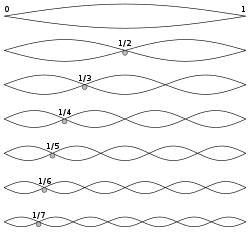
Back Гарманічны рад гукаў Byelorussian Гарманічны шэраг гукаў BE-X-OLD Sèrie harmònica (música) Catalan Harmonická řada (hudba) Czech Overtone Danish Naturtonreihe German Naturtonserio Esperanto Serie armónica (música) Spanish سری هارمونیک (موسیقی) Persian Yläsävelsarja Finnish

The harmonic series (also overtone series) is the sequence of harmonics, musical tones, or pure tones whose frequency is an integer multiple of a fundamental frequency.
Pitched musical instruments are often based on an acoustic resonator such as a string or a column of air, which oscillates at numerous modes simultaneously. As waves travel in both directions along the string or air column, they reinforce and cancel one another to form standing waves. Interaction with the surrounding air produces audible sound waves, which travel away from the instrument. These frequencies are generally integer multiples, or harmonics, of the fundamental and such multiples form the harmonic series.
The fundamental, which is usually perceived as the lowest partial present, is generally perceived as the pitch of a musical tone. The musical timbre of a steady tone from such an instrument is strongly affected by the relative strength of each harmonic.